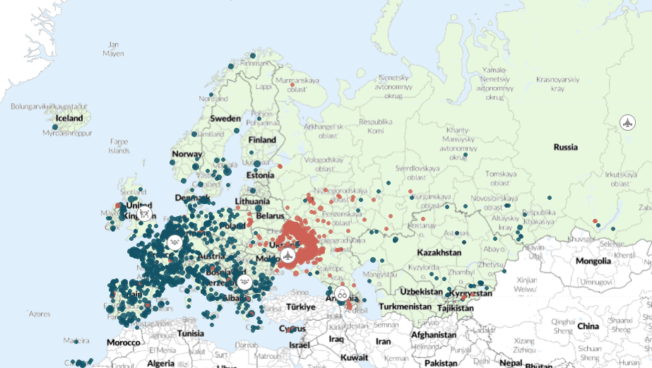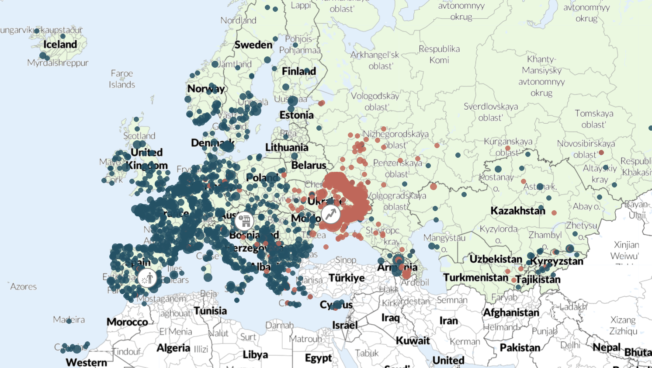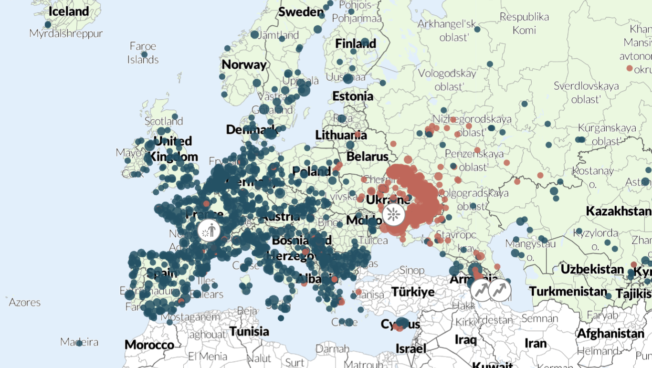Regional Overview
Europe & Central Asia
March 2023
Posted: 6 April 2023
 Ukraine: Civilian toll rises as fighting intensifies
Ukraine: Civilian toll rises as fighting intensifies
Russian forces continued to hit civilian targets across Ukraine, leading to over 100 reported civilian fatalities – a 40% increase compared to the previous month – with the Donetsk, Kherson, and Zaporizhia regions among the most affected. While the overall intensity of Russian shelling, artillery, and missile strikes only slightly increased – with notable increases in the Chernihiv, Kherson, and Zaporizhia regions – the number of resulting reported civilian fatalities went up from 71 in February to 91 in March. Meanwhile, slightly fewer Russian air and drone strikes became deadlier, leading to 17 reported civilian fatalities. In addition, the number of events involving the detonation of mines and other explosives doubled compared with the previous month, as the weather improved and people increasingly accessed contaminated areas. Such events led to over 20 additional reported civilian fatalities in March. Fighting continued to be concentrated in eastern and southern Ukraine. In the Donetsk region, Russian forces seized several settlements to the north and south of Bakhmut as well as most of the town itself. Ukrainian forces maintained control of the western part of Bakhmut, relying on the sole narrow supply route toward neighboring Chasiv Yar. Another Russian semi-encirclement could threaten Avdiivka, a Ukrainian stronghold north of the Russian-occupied Donetsk city, which Russian forces subjected to a massive air bombing campaign.1Meduza, ‘Tell-tale signs,’ 22 March 2023
For more information, see ACLED’s Ukraine Conflict Monitor
 Armenia-Azerbaijan: Tensions rise as talks falter
Armenia-Azerbaijan: Tensions rise as talks falter
Ceasefire violations on the line of contact around the non-recognized Armenian-majority Artsakh Republic and along Armenia’s borders with Azerbaijan sharply increased in March, with armed clashes reaching their highest levels since November 2022.2Irina Tumakova, ‘The thing I miss the most? Freedom,’ Novaya Gazeta – Europe, 24 March 2023 The deadliest fighting centered on a mud road near Shusha that was being used as an alternative route to the Lachin Corridor linking Artsakh to Armenia. Azerbaijani self-described environmental activists have been blocking the Lachin Corridor since 12 December 2022. Three Artsakh policemen and two Azerbaijani servicemen reportedly died in a shootout on 5 March. Following accusations by Russian peacekeepers that Azerbaijani forces initiated the clash,3Ministry of Defence of the Russian Federation, ‘Update of the Ministry of Defence of the Russian Federation on the Activity of the Russian Peacekeeping Contingent in the Area of the Nagorno-Karabakh Conflict (as of 6 March 2023),’ 6 March 2023 Azerbaijan released footage purporting to show Russian peacekeepers escorting Armenian and Artsakh military transports on the same mud road on several occasions after the incident.4Ministry of Defence of the Republic of Azerbaijan, ‘Information of the Ministry of Defense’, 7 March 2023; Ministry of Defence of the Republic of Azerbaijan, ‘Information of the Ministry of Defense’, 11 March 2023; Ministry of Defence of the Republic of Azerbaijan, ‘Russian Peacekeeping Contingent Accompanies Illegal Transportation’, 21 March 2023; Ministry of Defence of the Republic of Azerbaijan, ‘Unlawful Military Transportation For Illegal Armenian Formations Continues’, 24 March 2023 On 25 March, Azerbaijani forces occupied a height overlooking the road in a claimed attempt to stop the flow of weapons and ammunition from Armenia to Nagorno-Karabakh.5Ministry of Defence of the Russian Federation, ‘Update of the Ministry of Defence of the Russian Federation on the Activity of the Russian Peacekeeping Contingent in the Area of the Nagorno-Karabkah Conflict (as of 25 March 2023),’ 25 March 2023; Ministry of Defence of the Republic of Azerbaijan, ‘Information of the Ministry of Defense of the Republic of Azerbaijan’, 25 March 2023 Meanwhile, attacks against civilians in Artsakh resumed after a lull in winter, with Azerbaijani forces targeting farmers with small-arms and heavy-machine-gun fire in the Martuni region. The rising violence comes against the backdrop of an apparent deadlock in peace negotiations. After meeting with Azerbaijani representatives in the presence of Russian peacekeepers on 1 March,6The Trend, ‘Initial discussions held on reintegration of Armenian residents of Karabakh region to Azerbaijan,’ 1 March 2023 Artsakh representatives rejected subsequent Azerbaijani invitations for meetings in Baku, arguing that further talks ought to be held in the presence of the Russian peacekeepers.7Ruzanna Stepanian, ‘Karabakh Armenians Again Reject ‘Reintegration’ Talks In Baku,’ Radio Free Europe / Radio Liberty Armenian Service, 28 March 2023
 Georgia: ‘Foreign agent’ bill scrapped amid anti-government demonstrations
Georgia: ‘Foreign agent’ bill scrapped amid anti-government demonstrations
Demonstrations erupted in Georgia’s capital Tbilisi and other cities in early March over the attempted adoption of a ‘foreign agent’ bill. The bill would require not-for-profit and media organizations receiving over 20% of their funding from abroad to register as ‘foreign agents’ and submit an annual financial declaration. Similar legislation in Russia has been used to muzzle non-governmental and media organizations.8Giorgi Lomsadze, ‘Far from FARA? Georgia’s foreign agent law controversy,’ Eurasianet, 6 March 2023 The United States, European Union, and human rights advocacy groups criticized the bill,9Kelly C. Degnan, ‘Ambassador Degnan’s Remarks to Media at the National Bank of Georgia,’ U.S. Embassy Tbilisi, 27 February 2023; Josep Borell, ‘Georgia: Statement by the High Representative on the adoption of the “foreign influence” law,’ EU External Action Service, 7 March 2023; Human Rights Watch, ‘Georgia: ‘Foreign Agents’ Bill Tramples on Rights,’ 7 March 2023 as did Georgian President Salome Zourabichvili, who vowed not to sign it into law.10Salome Zourabichvili, ‘Address by the President on the ‘Foreign Agent’ Law,’ President of Georgia, 7 March 2023 On 7 March, demonstrators clashed with police in Tbilisi as the bill passed the first reading.11RFE/RL Georgian Service, ‘Georgian Security Forces Use Force To Break Up Second Day Of ‘Foreign Agent’ Law Protests,’ 8 March 202 Demonstrators also attempted to break into the parliament building overnight, before announcing a ‘siege’ of parliament on 8 March and attempting to break through fences around it. Police responded with water cannons and tear gas. On 9 March, the ruling Georgian Dream party withdrew the bill.12Felix Light, ‘Georgian ruling party drops ‘foreign agents’ bill, protesters remain,’ Reuters, 9 March 2023 Over 130 people detained during demonstrations were subsequently released.13Ministry of Internal Affairs of Georgia, ‘Statement of the Ministry of Internal Affairs,’ 9 March 2023 The latest legislative moves come after Georgia failed to obtain EU candidate status along with Moldova and Ukraine in June 2022 due to governance and rule of law concerns.14European Commission, ‘Opinion on the EU membership application by Georgia,’ 17 June 2022
 France: Demonstrations turn violent as government pushes through pension reform bill
France: Demonstrations turn violent as government pushes through pension reform bill
Mass demonstrations over plans to raise the minimum retirement age continued in France throughout March. On 16 March, the government resorted to a constitutional provision – Article 49.3 – to bypass a full parliamentary vote and enact the pension reform bill. The government subsequently survived two no-confidence motions, leading to the adoption of the reform.15Mariama Darame and Jérémie Lamothe, ‘French government narrowly survives no-confidence vote, but looks more isolated than ever,’ Le Monde, 21 March 2023 The move triggered further demonstrations, some of which turned violent. On 23 March, amid a ninth nationwide demonstration day, an estimated 1-3.5 million demonstrators marched in at least 300 cities across the country.16France24, ‘Retraites : regain de mobilisation et de tensions, nouvelle journée d’actions mardi,’ 23 March 2023 At least 47 demonstration events turned violent. In several locations, residencies and offices of the deputies who had voted against the no-confidence motions were vandalized. In Bordeaux, the entrance gate of the city hall burnt down in an arson attack. In Lyon, rioters threw stones at the fourth district town hall. In Nantes, rioters ransacked an administrative hall. In Lorient, demonstrators assaulted the sub-prefecture and the main police station. Multiple clashes were also recorded in Paris, where furniture and garbage were set on fire. On 28 March, the demonstrations continued, albeit less numerous. France’s Constitutional Council will rule on the legality of the pension reform on 14 April.17Le Monde and Agence France-Press, ‘France’s Constitutional Council to rule on Macron pension reform on April 14,’ 29 March 2023
 Greece: Train crash triggers mass demonstrations
Greece: Train crash triggers mass demonstrations
The head-on collision between a passenger train and freight train near Tempe in Greece on 28 February killed 57 people, triggering outrage over mismanagement of the railways and overall quality of governance in the country.18Florian Schmitz, ‘Greece Train Crash: Protesters Rage at Political System,’ Deutsche Welle, 14 March 2023 Mass demonstrations and strikes occurred across the country in March – the largest since the incumbent government assumed office in 2019. Albeit mostly peaceful, some demonstrations turned violent, especially on the peak days of 8 and 16 March in the major cities of Athens and Thessaloniki. Hooded individuals hurled stones, paint, and explosives at riot police, set cars and dumpsters on fire, and smashed shop windows. The police responded with tear gas and stun grenades. In addition, the Ministry of Citizens’ Protection ordered an investigation into reports of police violence against peaceful protesters and photojournalists during a demonstration in Athens on 5 March. A general election – due in July but hitherto expected in early April – has been scheduled for 21 May.19Nektaria Stamouli, ‘Greece to hold national election on May 21,’ Politico, 28 March 2023
See more
See the Codebook and the User Guide for an overview of ACLED’s core methodology. For additional documentation, check the Resource Library. Region-specific methodology briefs can be accessed below.
Links:
For additional resources and in-depth updates on the conflict in Ukraine, check our interactive Ukraine Conflict Monitor.







